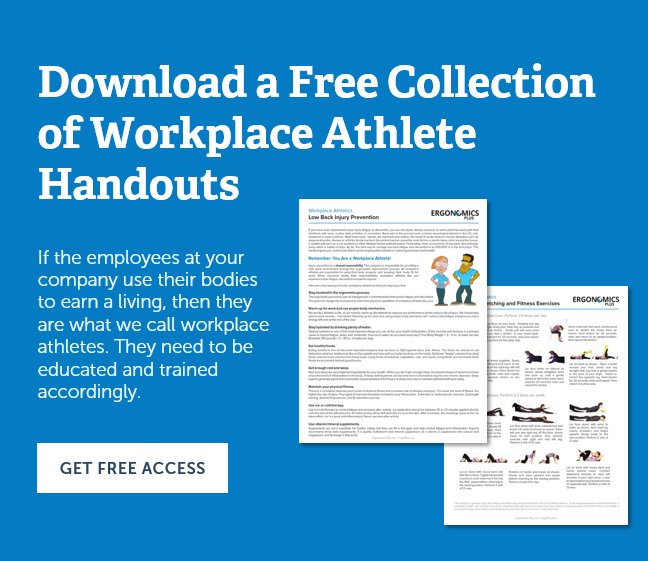Editor’s Note: Injury prevention and wellness handouts are an effective (and inexpensive) way to educate and motivate employees to use good work practices and take care of their bodies.
Scroll to the bottom of this post for the free Wellness Handout PDF file.
With temperatures rising, so does the risk of heat related illnesses in individuals who work or exercise in hot and humid temperatures.
Your body’s mechanism of cooling itself off is by sweating. The body is unable to cool itself off as efficiently in hot and humid temperatures. When you sweat, you are losing mainly sodium and water. It is important to replace your electrolytes and fluids to keep the body balanced and to avoid dehydration or a heat related illness.
Every system in your body depends on proper hydration to function properly. Water makes up a large portion of our body. It makes up approximately 50% of a woman and 60% of a man’s body mass.
You should consume at least half your body weight in ounces of water per day. Water from foods such as fruits and vegetables count as part of your water intake. If you are thirsty you are already dehydrated or on your way to dehydration.
Types of Heat Related Illnesses
- Heat rash
- Heat cramps
- Heat exhaustion
- Heat stroke
Sign and Symptoms
- Muscle Cramps.
- Nausea and vomiting.
- Headaches.
- Dizziness.
- Dry Mouth.
- Lightheadedness.
- Skin not as elastic.
- Dark urine color. Some medications, foods or vitamins can cause the urine to be more yellow or darker in color.
Prevention
- Replace fluids before, during and after work or activity.
- Wear one layer of loose, light colored clothing when working inside or outside in hot temperatures.
- Replace fluids and electrolytes lost.
- Drink cool water rather than cold water because the body absorbs it more rapidly.
- Stretch before, during and after work or activity.
- Take micro-breaks in cool area.
- Avoid or limit alcohol and caffeinated beverages consumption.
Free Wellness Handout – Prevent Dehydration and Heat Related Illnesses
Dehydration and Heat Related Illnesses (PDF)
Handout by Angela Perry.
